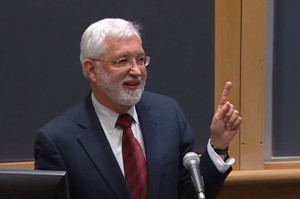 I have written how the religious liberty doctrine is grossly unbalanced based on a distortion of Founding anti-establishment liberty. Unfortunately, it looks as though that unbalance is about to become far worse. On November 2nd, the United States Supreme Court announced it will decide a case, in part, on whether the Establishment Clause bars state and local government from taxing citizens to maintain a 40-foot Christian cross WW1 memorial.
I have written how the religious liberty doctrine is grossly unbalanced based on a distortion of Founding anti-establishment liberty. Unfortunately, it looks as though that unbalance is about to become far worse. On November 2nd, the United States Supreme Court announced it will decide a case, in part, on whether the Establishment Clause bars state and local government from taxing citizens to maintain a 40-foot Christian cross WW1 memorial.
The reason the case is all but assured to end in finding that the state may indeed maintain a religious monument is most members of the Court have established viewpoints on the issue. Justice Brett Kavanaugh has praised previous dissents that denied a strict separation of church and state and argued “Christianity ought to receive encouragement from the state.” Justice Clarence Thomas does not even believe the Establishment Clause applies to the states. Justices Neil Gorsuch, Samuel Alito, Elena Kagan, Stephen Breyer, and Chief Justice John Roberts have all previously agreed using taxpayer dollars to improve church property is permissible. Given the text and plain meaning of the Establishment Clause, the views of the majority of the Court are perplexing to say the least.
The Establishment Clause was founded upon the deep-rooted Constitutional principle of freedom of conscience. Regarding free conscience in the religious liberty context, James Madison stated citizens must be free “to render to the Creator such homage and such only as he believes is acceptable to him.” In other words, religious freedom is based on the premise that the individual alone holds the power to make up their own mind about what service to give to religion. No matter how well intentioned, the state is not to make the choice for anyone. Madison was also clear that civil society being separated entirely from religion did not infringe upon other rights stating: “We maintain therefore that in matters of Religion, no man’s right is abridged by the institution of Civil Society and that Religion is wholly exempt from its cognizance [emphasis mine].”
Accordingly, nothing regarding anti-establishment liberty prevents government actors from personally expressing references to a belief or trust in God. Free speech remains a part of the First Amendment as well, after all. Rather, what the Establishment Clause does require is a strict adherence to the principle that civil mechanisms do not encroach upon the free conscience of citizens by forcing them to pay for or share religious views. When state governments tax citizens to maintain religious symbols (regardless of whether any taxpayer objects), they violate free conscience by forcing citizens to pay for a religious message they might otherwise disagree with.
The majority of the Court understands this principle well and applies the First Amendment religious liberty prohibition against government coercion correctly in other contexts. In Janus v. AFSCME, the Court held the state of Illinois could not extract agency fees from nonconsenting public-sector employees. In issuing its opinion in Janus, the Court stated:
Whenever the Federal Government or a State prevents individuals from saying what they think on important matters or compels them to voice ideas with which they disagree, it undermines these ends. When speech is compelled, however, additional damage is done. In that situation, individuals are coerced into betraying their convictions. Forcing free and independent individuals to endorse ideas they find objectionable is always demeaning, and for this reason, one of our landmark free speech cases said that a law commanding “involuntary affirmation” of objected-to beliefs would require “even more immediate and urgent grounds” than a law demanding silence.
In fact, the famous phrase the Court relies on in the Janus case, “to compel a man to furnish contributions of money for the propagation of opinions which he disbelieves and abhor[s] is sinful and tyrannical,” comes from Thomas Jefferson’s preamble to the Virginia Statute for Religious Liberty. It is astounding to think the Court could utilize religious liberty protections against coercion to prevent a state from compelling public-sector union speech, yet find it completely acceptable for a state to extract money from citizens to compel large and expensive religious monuments. Such a result is to make a mockery of our Constitutional religious liberty principles and I hope the Court does not reach it.
An argument the majority of the Court appears likely take in upholding state-funded maintenance of a religious monument is state governments have a long tradition of established churches. Relying on these past practices to dilute plain meaning Establishment Clause intent however presents glaring problems. For one thing, the Establishment Clause was only incorporated to the states in the mid-20th century. It should go without saying that all state assessment frameworks that blurred the line between church and state prior to being under Establishment Clause scrutiny are irrelevant to current Establishment Clause doctrine.
For another, it is absolutely clear that Madison — the leading Founder in regard to religious liberty and the lead representative in Congress in passing the First Amendment — would have viewed this case as a violation. As I wrote before, Madison stanchly opposed and defeated on free conscience grounds a religious-neutral, non-preferential assessment bill that gave citizens complete autonomy to direct funds however they wanted, including for religious purposes. It defies all common sense to say that while Madison opposed an assessment framework that offered individual citizens complete autonomy to service religion or not, he would have been fine with the assessment at issue here which offers citizens no choice on whether to fund a religious monument.
But perhaps most importantly, to allow the government to compel citizens for the payment of religious monuments, even based on tradition, but to deny public union extractions would amount to an egregious viewpoint discrimination. Yet that is exactly what the Court appears willing to decide. I hope for the sake of religious liberty I am wrong.
 Tyler Broker is the Free Expression and Privacy Fellow at the University of Arizona James E. Rogers College of Law. His work has been published in the Gonzaga Law Review and the Albany Law Review. Feel free to email him or follow him on Twitter to discuss his column.
Tyler Broker is the Free Expression and Privacy Fellow at the University of Arizona James E. Rogers College of Law. His work has been published in the Gonzaga Law Review and the Albany Law Review. Feel free to email him or follow him on Twitter to discuss his column.
The post Religious Liberty Is Under Significant Threat This Term appeared first on Divorce Your Ring.
source https://divorceyourring.com/top-posts/religious-liberty-is-under-significant-threat-this-term/


 Of all the characters on Seinfeld, George was my favorite. His laziness and his creativity; his self-loathing and his overconfidence. He was a hilarious juxtaposition of human traits whose behavior sometimes bordered on diagnosable mental disorder.
Of all the characters on Seinfeld, George was my favorite. His laziness and his creativity; his self-loathing and his overconfidence. He was a hilarious juxtaposition of human traits whose behavior sometimes bordered on diagnosable mental disorder. Evan Gibbs is an attorney at Troutman Sanders, where he primarily litigates employment cases and handles traditional labor matters. Connect with him on LinkedIn here, or e-mail him here. (The views expressed in this column are his own.)
Evan Gibbs is an attorney at Troutman Sanders, where he primarily litigates employment cases and handles traditional labor matters. Connect with him on LinkedIn here, or e-mail him here. (The views expressed in this column are his own.) The 10ish weeks you spend preparing for the bar exam will go by faster than you can ever imagine. Once bar prep gets started, you won’t have the time to figure out how to best manage it. That is precisely why you need to plan now for how to best utilize your time. Use these tips to get you started.
The 10ish weeks you spend preparing for the bar exam will go by faster than you can ever imagine. Once bar prep gets started, you won’t have the time to figure out how to best manage it. That is precisely why you need to plan now for how to best utilize your time. Use these tips to get you started. Kerriann Stout is a millennial law school professor and founder of Vinco (a bar exam coaching company) who is generationally trapped between her students and colleagues. Kerriann has helped hundreds of students survive law school and the bar exam with less stress and more confidence. She lives, works, and writes in the northeast. You can reach her by email at info@vincoprep.com.
Kerriann Stout is a millennial law school professor and founder of Vinco (a bar exam coaching company) who is generationally trapped between her students and colleagues. Kerriann has helped hundreds of students survive law school and the bar exam with less stress and more confidence. She lives, works, and writes in the northeast. You can reach her by email at info@vincoprep.com.

 It seems that everything President Trump comments on receives a good deal of scrutiny, but when it comes to his Twitter account, the dialogue can be scathing. Recently, President Trump decided to tweet about the upcoming re-imposition of sanctions against Iran as a result of his decision to withdraw from a 2015 accord negotiated by the Obama administration. In tweeting about this point, President Trump decided to do his own take on a meme from HBO’s hit series “Game of Thrones.” More specifically, he modified the often-quoted line from the series (now a registered trademark of HBO), “Winter is Coming,” by tweeting “Sanctions are Coming” using a similar font over a picture of himself giving a stern look that, in my humble opinion, attempts to channel the Dothragi. Soon thereafter HBO took to the social media platform objecting to his purported “trademark misuse.” Apart from the turn of phrase (more on that below), the real issue seems to be his attempt at parody, and there is more to it than you may think.
It seems that everything President Trump comments on receives a good deal of scrutiny, but when it comes to his Twitter account, the dialogue can be scathing. Recently, President Trump decided to tweet about the upcoming re-imposition of sanctions against Iran as a result of his decision to withdraw from a 2015 accord negotiated by the Obama administration. In tweeting about this point, President Trump decided to do his own take on a meme from HBO’s hit series “Game of Thrones.” More specifically, he modified the often-quoted line from the series (now a registered trademark of HBO), “Winter is Coming,” by tweeting “Sanctions are Coming” using a similar font over a picture of himself giving a stern look that, in my humble opinion, attempts to channel the Dothragi. Soon thereafter HBO took to the social media platform objecting to his purported “trademark misuse.” Apart from the turn of phrase (more on that below), the real issue seems to be his attempt at parody, and there is more to it than you may think. Tom Kulik is an Intellectual Property & Information Technology Partner at the Dallas-based law firm of Scheef & Stone, LLP. In private practice for over 20 years, Tom is a sought-after technology lawyer who uses his industry experience as a former computer systems engineer to creatively counsel and help his clients navigate the complexities of law and technology in their business. News outlets reach out to Tom for his insight, and he has been quoted by national media organizations. Get in touch with Tom on Twitter (
Tom Kulik is an Intellectual Property & Information Technology Partner at the Dallas-based law firm of Scheef & Stone, LLP. In private practice for over 20 years, Tom is a sought-after technology lawyer who uses his industry experience as a former computer systems engineer to creatively counsel and help his clients navigate the complexities of law and technology in their business. News outlets reach out to Tom for his insight, and he has been quoted by national media organizations. Get in touch with Tom on Twitter (
 David Lat is editor at large and founding editor of Above the Law, as well as the author of Supreme Ambitions: A Novel. He previously worked as a federal prosecutor in Newark, New Jersey; a litigation associate at Wachtell, Lipton, Rosen & Katz; and a law clerk to Judge Diarmuid F. O’Scannlain of the U.S. Court of Appeals for the Ninth Circuit. You can connect with David on Twitter (@DavidLat), LinkedIn, and Facebook, and you can reach him by email at dlat@abovethelaw.com.
David Lat is editor at large and founding editor of Above the Law, as well as the author of Supreme Ambitions: A Novel. He previously worked as a federal prosecutor in Newark, New Jersey; a litigation associate at Wachtell, Lipton, Rosen & Katz; and a law clerk to Judge Diarmuid F. O’Scannlain of the U.S. Court of Appeals for the Ninth Circuit. You can connect with David on Twitter (@DavidLat), LinkedIn, and Facebook, and you can reach him by email at dlat@abovethelaw.com.